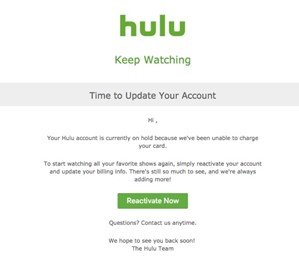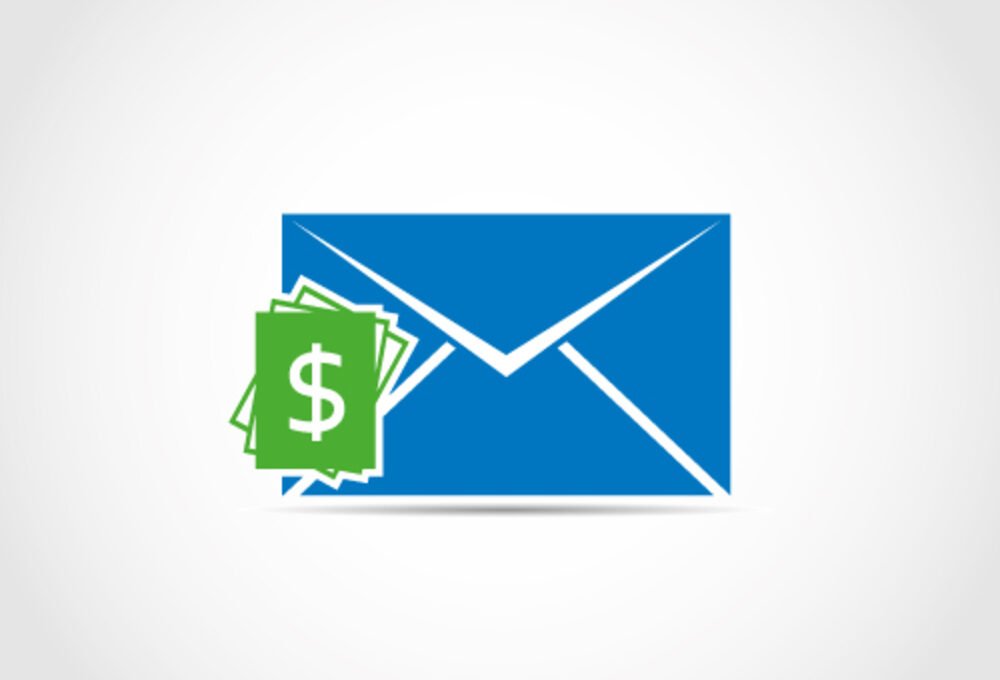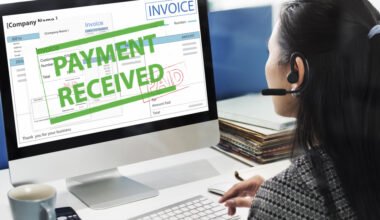As consumers, many of us may already be familiar with emails we see very frequently in our inboxes. When one of our social media accounts, or services requires payment, and we put it in, but it doesn’t go through, we will find a notification in our inbox, “Your payment did not go through”. These transactional emails that have account information and invoices attached to remind customers of due payment are what we call a dunning email. You will also usually find these emails will outline what will happen if you don’t pay. Look at this example from our friends at Hulu:

Types of Dunning Communications
If you are a service provider and you need to contact your customers to remind them their payments are failing or not going through, you will need effective ways to get your message across without sounding like a gangster lurking in the dark awaiting his cut of the profits. A dunning communication is meant to ease your customers into paying for the services they get without scaring them off or pressuring them into using your service with the overhead obligation that they need to pay. So, the kind of information that will go into communication is also important. Let’s see how many ways you have as a service provider to reach out to your consumers:
Dunning text:
The most common channel of communication between a service provider and their customer is text messages. If you have subscribed to a service, you include your contact information and receive notifications. A dunning text will be sent to you if your payments fail or if you forget to make your monthly payment to keep using the service. It will be a brief reminder that goes something like, “…your payment for this service is about to be suspended, and to continue using the service, kindly make the payment before [date].”
Dunning email:
Similar to a text but usually more elaborative, you might have seen a dunning email in your inbox too. They outline your account information and notify you that your payment is pending. A dunning email will usually also contain a cordial message reminding you of the need for a quick payment or immediate payment. It is usually a fine balance of urgency but with a sweet hand. These texts will often start with, “… we love having you as our subscriber, to ensure that you keep getting our latest services, please pay before [date] to avoid suspension of your privileges.”
Follow-up phone calls:
Now this kind of communication is more common from financial services like banks credit card companies and collection agencies. If you have outstanding debt or payments, you will often receive phone calls after initial communication through emails or texts. These phone calls are personalized communication channels to notify and politely warn customers of the consequences of lateness or non-payment.
Personalized payment plan offers:
Although less common, you will find these communication chains with collection agencies as well. When a specific debtor fails to make payments regularly, an agent will reach out to inquire about the issues regarding the late payments. Upon discovering the financial issues, they will often propose payment plans crafted to specific financial situations of the debtors. These communication efforts also take a polite tone to ensure there is no hostility or discomfort to the consumer or subscriber.
How to Craft the Ideal Outreach – Dunning Email Examples
Now let’s come to a more specific part of the art of dunning emails. As a service provider and specifically a collection agency, you will often find yourself in need of a good communication channel and tool to get through to your toughest debtors and non-payers. As it is delinquency accounts that are the most frequent reason for bad accounts receivable and low profitability, communication is a key aspect of debt recovery.
So, you know that communication is important, and it can be tricky to find the right words to communicate your haste without sounding too pushy. This part of the communication can decide whether your debtor or subscriber will go rogue or stick it out with you and make the payment. It’s all in the wording so let’s look at the different ways that you can communicate with your customer. Feel free to copy the following text and use it for your outreach.
Types of Dunning Email Templates
The Brief Dunning Email:
Here is an example of a short email template that you can use as a first reminder to your debtor.
Hi [Name],
We were unable to process your recent payment because your credit card was declined.
Would you mind updating and re-entering your card information? It will only take a few moments of your time. Click here to update your information.
Please feel free to reach out to us if you have any questions, at any time. Also, check out our FAQ page for more information if you still have queries.
Best Regards,
[YOUR SIGNATURE]
The Casual Dunning Email:
Hey [Name],
I got a notification that your payment for [Product/ Service] failed. How inconvenient! Luckily, this happens to a lot more users than you’d think, so don’t think about it too much!
Usually, it has something to do with:
Your card expiring,
Having insufficient funds or maxing out your daily spending limit,
Your card is stolen, lost, or was buried in the yard by your dog!
Update My Billing Info
Please check what’s going on and get it fixed ASAP so we can get back to having you as our beloved subscriber by [using the services provided].
Cheers,
[YOUR SIGNATURE]
The ‘Loss Aversion’ Dunning Email:
Hey there [Name],
Just a quick heads up that your [Product/ Service] subscription has been officially paused until you update your payment details.
If you don’t …
You won’t be able to use our service anymore.
You’ll lose access to your premium features like [feature 1, feature 2, etc.]
However, you can avoid all that by taking 30 seconds to update your details: billing link.
Reply here or hop onto a live chat with us if you have any questions or require any help.
And as always, thanks so much for using [Product/ Service]. We love what we do, and people like you make it all possible.
Cheers,
[YOUR SIGNATURE]
Some Catchy Dunning Email Subject Lines to Get You Started
When sending emails to your subscriber or especially a debtor, it is important that your tone is urgent but friendly, so they don’t get thrown off and archive you. To ensure that, you should craft an assertive but friendly subject line that outlines your intentions but maintains your brand bravado as well.
- “Urgent: Address Your Outstanding Balance Today!”
- “Time-Sensitive: Important Update Regarding Your Payment”
- “Hey! Final Reminder: Settle Your Overdue Payment ASAP”
You can also go with some cordial messages that will remind them of the urgency but with a lighter tone:
- Let’s Chat: Easy Steps to Settle Your Account”
- “We’re Here to Help: Address Your Payment Today”
- “Just Checking In Time to Settle Your Account”
- “Help Us Help You: Take a Moment for Your Payment”
- “Warm Greetings: Let’s Work Together on Your Payment”
Do Your Research for the Dunning Letter Email – Make it Your Own!
Remember to always craft the message that you send to your debtors or subscribers with love and personalization. In the sea of messages, emails, and texts that a consumer gets, your notification will only stand out if you put the work in. To ensure that your notification attempts are not falling to blind eyes and deaf ears, you must get creative with the way that you write your dunning texts and emails.
If you want additional help, there is no harm in checking out the resources that will work for you as well. You can check out the Stripe dunning emails resources to get a head start and then make the email your own. But communication is 80% of your relationship with your customer, and to ensure that the bridges that are built there remain standing, you must pay some attention to how you communicate with them to keep the strings attached and strengthen over time.
Another important tip! Don’t miss this part!
Before you start to use any resource present here or anywhere else you have to ensure that you have a debt collection license in your state. There are only 14 states that don’t require you to have a debt collection license:
- Georgia
- Kansas
- Kentucky
- Michigan
- Missouri
- Montana
- New Hampshire
- New York
- Ohio
- Oklahoma
- Pennsylvania
- South Dakota
- Vermont
- Virginia
If you do not have a license to collect debt, then sending dunning emails or contacting debtors on your own to collect debt will be illegal and can lead to litigation and potential issues for you. As a business owner, make sure you don’t operate without a license, so you don’t get into trouble!
Go forth and communicate with the strongest tools in your arsenal!






